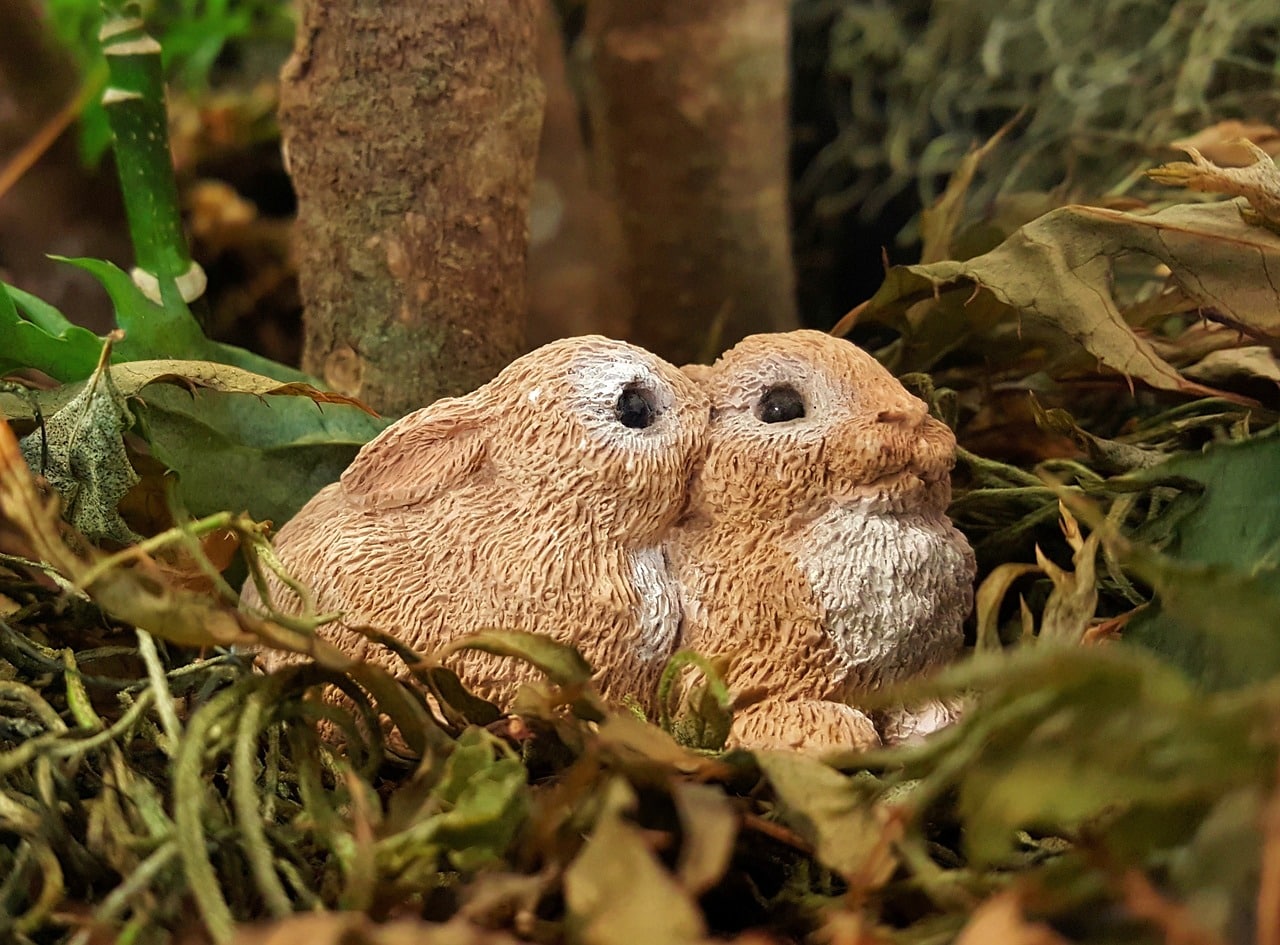Can Rabbits Have Allergies? Make Them Better 5 Easy Steps
Can rabbits have allergies? Yes, rabbits can have allergies to mites, fleas, cigarette smoke, fumes, strong scents, cleaning products, and food.
You’ll certainly find this ironic:

Some pet owners would claim that their bunnies have an allergy to hay. In such a case, the most common cause is the dust in hay and not the hay itself.
Regardless, allergies in rabbits are poorly and rarely diagnosed. Usually, these are manifested with watery and red eyes or sneezing.
Probably, you would think that your pet merely has a fever. But this might not be the case because it’s also one of the symptoms of allergy.
Most people fail to recognize these early signs; that is why simple exposure to allergens often results in severe complications like bronchitis, chronic rhinitis, and respiratory infections.
If you identify allergens timely and limit the exposure of rabbits to them, severe respiratory infections can be prevented.
As a pet owner myself, I need to know the common allergens and the particular foods that my Thumper is sensitive to in order to avoid such issues.

You should, too; allergies are not a joke.
For that very reason, I come up with this info post to let you know the essential facts regarding allergies and rabbits.
Specifically, you are about to know the signs or symptoms of allergy, the common irritants, and treatment methods that you can perform if ever your pet has an allergy.
Let’s start!
Can rabbits have allergies? Signs That Your Rabbits Might Have Allergy
You already know the answer when asked, can rabbits have allergies?
Rabbits can have allergies. That’s why as much as possible, you should not let your rabbits suffer from allergies for a prolonged period.
Here’s the key to preventing this from happening:
Look out for the signs!
This way, you can instantly perform the appropriate measures as soon as they are exposed to allergens or show signs of allergy.
The most common signs that should be noted include red eyes and discharge from the nose.
One time, Thumper suffered from allergies. He kept on touching his face and nose through his paws, and yes, it can also be a sign that he has an allergy.
Also, Thumper rubs its face onto the ground repeatedly. I eventually found out that environmental allergens typically cause these symptoms.
Here’s what you should take note of:
In instances where your pet acquires its allergy from the food he eats, the symptoms can be different.
These include scratching and itching, licking its feet constantly, repeatedly scooting and scratching the back end, ear problems, scabbing, hair loss, unhealthy coat, diarrhea, and gastrointestinal issues such as soft tools and vomiting.
However, changes in the rabbit’s coat, like skin lesions and fur loss might take some time before it becomes noticeable. Commonly, it takes several months.
Furthermore, the symptoms mentioned above can worsen as the rabbit’s immune system builds a stronger response as it is continuously exposed to an allergen.
The very first thing that you will probably notice is the change in its poop. The apparent signs include refusing to eat, bloating, loose stools, among others.
Most Common Irritants To Rabbits

The key to preventing allergies is keeping your rabbit away from the things that can irritate them.
Some of the most common sources of allergies to rabbits include dust, cigarette smoke, carpet cleaning products, and room fresheners.
Strong scents can also cause an allergic reaction. Even to us humans, the strong odor can be irritating, what more to a tiny rabbit.
Another source of the allergen is the fireplace fumes.
Thus, you have to ensure that you keep your house with proper ventilation wherein the carbon dioxide fumes will be dispersed quickly.
Here’s what’s more ironic:
Rabbits can also be sensitive to hay, especially the poor-quality ones.
That is because this kind of hay is usually dusty, so it can possibly give bunnies some reaction.
In addition to this, rabbits can also be allergic to their bedding when it is not replaced and cleaned frequently.
Soiled bedding causes a build-up of ammonia which causes allergy.
In case of an allergy to bedding, changing the bedding will help your rabbit to get rid of allergies almost immediately or within 2-3 days.
Fleas and mites are capable of causing an allergic reaction in rabbits. The most common mites that affect rabbits include ‘Fur mites’ or ‘walking dandruff’.
Treatment Methods
As mentioned earlier, prolonged exposure to an allergen can lead to bronchitis, chronic rhinitis, and respiratory infections.

So to avoid these from happening, you have to know the preventative measures such as:
- Using detergents without or with less scent only
- Utilizing a fan to circulate the air
- Install HEPA filters
- Removing dust by cleaning the air ducts
- Using natural floor cleaner to avoid chemical exposure
- Regular dusting of the rabbit’s cage as well as the household items
- Switching to natural cleaning products like baking soda and vinegar
- Removing things that can cause allergen at your home
If the rabbit has inflammation, it is best to consult the vet right away.
Usually, your vet will prescribe corticosteroids and antihistamines to manage it.
But of course, your vet can determine whether your pet has an infection or allergy since these two symptoms are quite similar.
Get your pet prepared.
Your vet will have to draw a blood test to find out.
Food Allergies
In this section, we will focus on food allergies.
You’re already aware of this:
Some rabbits are sensitive to food, such as rabbit treats, fruits, vegetables, and pellets. Primarily, the symptom includes skin irritation.
But, what causes a food allergy?
Most often than not, it is due to genetics.
Rabbits might experience overreaction to some foods because they are genetically predisposed to them.
But sometimes, it can also be due to particular environmental factors that make the immune system of a rabbit overreact to some foods.
Now, what can you do to manage food allergies in your rabbits?
Unfortunately, there is no valid intradermal blood or skin test for food allergies.
Here’s the deal, though:
Step #1. Find out the food allergens
So the best thing that you can do to find out the food allergens that are causing allergies to your rabbit is food elimination.
Step #2. Have a new diet
Your vet can help you with this; he can suggest a new diet that is totally different from your rabbit’s existing food which was a cause to food allergy.
Step #3. Be strict on your new diet
He might ask you not to serve food other than the new diet for 8 to 10 weeks. Doing so will help the vet find out if the symptoms disappear or even lessen after you swap out the old food from your rabbit’s diet.
If this method works, you will see that your little bun has shown improvements during its new diet.
Step #4. Reintroduce certain foods
Then, you may be asked by your vet to reintroduce particular foods from the old diet slowly. You have to do this one ingredient at a time only to identify that to which ingredient your bunny is sensitive to.
Step #5. Monitor your pet
Every time you reintroduce an ingredient, make sure to monitor your pet for up to 2 weeks to see if the symptoms will return.
In such a case, you can confirm that certain food is one of your rabbit’s allergy causes.

Conclusion
Can rabbits have allergies? Yes, rabbits can be sensitive to some food and environmental allergens.
And if they will be exposed to these allergens for a long time, it can lead to severe respiratory problems.
That is why pet owners need to be aware of the things that usually cause allergies. Much more, it is also essential to know the things to do if you notice signs of allergy in your pet rabbit.
Prevention is better than cure so preventive measures should be taken to avoid allergies from occurring in the first place.
So in my case, I make sure that Thumper, my pet rabbit, will not be exposed to the common environmental allergens. I also do my research regarding symptoms, causes, and preventive measures of allergies.
